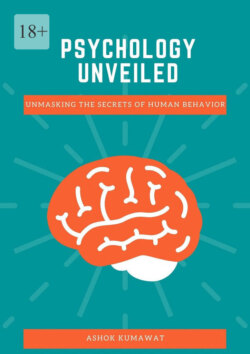Читать книгу Psychology Unveiled: Unmasking the Secrets of Human Behavior - Ashok Kumawat - Страница 10
На сайте Литреса книга снята с продажи.
Chapter 8: Motivation: The Driving Force Behind Human Behavior
ОглавлениеIntroduction:
Motivation serves as the internal drive that energizes and directs our behavior. It plays a fundamental role in shaping human behavior, influencing our actions, decisions, and achievements. This chapter delves into the intricacies of motivation, exploring its various theories, the factors that drive and sustain it, and its impact on human behavior. By unraveling the secrets of motivation, we gain valuable insights into the complexities of human behavior and the forces that propel us forward.
Understanding Motivation:
Motivation refers to the processes that activate, guide, and sustain goal-directed behavior. It involves the interplay of internal and external factors that initiate and regulate our actions. Motivation can be driven by a variety of needs, desires, goals, and rewards, influencing our thoughts, emotions, and actions.
Intrinsic and Extrinsic Motivation:
Motivation can be classified into two broad categories: intrinsic and extrinsic motivation. Intrinsic motivation refers to engaging in an activity for the inherent satisfaction, enjoyment, or personal interest it provides. Extrinsic motivation, on the other hand, involves engaging in behavior to attain external rewards or avoid punishments.
Both intrinsic and extrinsic motivations play important roles in our lives. While intrinsic motivation fosters creativity, passion, and self-determination, extrinsic motivation can provide external incentives and facilitate goal attainment. The interplay between these two forms of motivation shapes our behaviors and influences our overall well-being.
Theories of Motivation:
Several theories offer insights into the nature and dynamics of motivation. Maslow’s hierarchy of needs proposes that individuals are motivated to fulfill a series of hierarchical needs, ranging from physiological needs to self-actualization. According to self-determination theory, individuals are driven by the inherent human need for autonomy, competence, and relatedness.
The expectancy-value theory suggests that motivation is influenced by the perceived likelihood of success and the value attached to achieving a particular goal. Goal-setting theory emphasizes the importance of setting clear and specific goals, which can enhance motivation, effort, and performance. These theories provide frameworks for understanding the multifaceted nature of motivation and the factors that contribute to its initiation and maintenance.
Motivation and Emotion:
Motivation and emotion are closely intertwined. Emotions can serve as powerful motivators, driving us to seek pleasure, avoid pain, or fulfill our social and psychological needs. Positive emotions, such as joy and excitement, can enhance motivation and facilitate goal pursuit. Negative emotions, such as fear and anger, can motivate us to take action and protect ourselves from perceived threats.
The Role of Motivation in Achievement and Success:
Motivation is a key factor in determining our level of achievement and success. High levels of motivation can foster persistence, effort, and a willingness to overcome obstacles. Motivated individuals set challenging goals, exhibit a strong work ethic, and strive for continuous improvement. They are more likely to persevere in the face of setbacks and maintain focus on long-term goals.
Motivation can also impact academic performance, career success, and personal growth. It influences our choices, decision-making processes, and commitment to personal and professional endeavors. Understanding the factors that drive and sustain motivation is crucial for fostering achievement and realizing our full potential.
Cultivating and Sustaining Motivation:
Cultivating and sustaining motivation involves various strategies and practices. Setting clear, specific, and challenging goals can provide a sense of direction and purpose. Breaking goals into manageable tasks and monitoring progress can enhance motivation and create a sense of accomplishment. Creating an environment that supports autonomy, competence, and relatedness can foster intrinsic motivation and engagement.
Reward systems and incentives can also influence motivation, but they need to be carefully designed to avoid undermining intrinsic motivation or creating dependency on external rewards. Providing feedback, recognition, and opportunities for growth and development can further nurture motivation.
Conclusion:
Motivation serves as the driving force behind human behavior, influencing our actions, decisions, and achievements. By unraveling the secrets of motivation, we gain valuable insights into the complexities of human behavior and the forces that propel us forward.
Understanding the various theories of motivation, the interplay between intrinsic and extrinsic motivation, and the role of motivation in achievement and success empowers us to cultivate and sustain motivation in our lives. Unmasking the secrets of motivation enables us to harness this powerful force, pursue our goals, and unlock our full potential.
